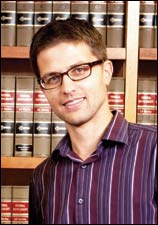Pitfalls of discussing ineffective assistance
By: WISCONSIN LAW JOURNAL STAFF//November 9, 2010//
By Kim Alderman and Byron Lichstein

This article is a follow-up to “Continuing Confidentiality in Ineffective Assistance of Counsel Claims,” published in the Oct. 19, 2010 edition of the Wisconsin Law Journal.
As discussed in our Oct. 19 article, ineffective assistance of counsel (IAC) is a common claim in Wisconsin criminal appeals because it often serves as the only vehicle to reach issues that would otherwise be waived.
One of the challenges appellate counsel face in litigating IAC claims is knowing when and how to communicate with trial counsel. Most trial attorneys understand that appellate attorneys are seeking only to fulfill their constitutional responsibility to do whatever possible to assist their clients. Nonetheless, such conversations present complex issues. This article makes recommendations for how to approach and memorialize such inquiries.
Appellate counsel should first communicate with trial counsel early in the process of identifying potential issues for appeal, before making any decisions about litigation strategy. During this initial conversation, appellate counsel typically seeks to elicit trial counsel’s impressions, hoping trial counsel will share ideas about appealable issues. Frank communication by trial counsel at this stage can immensely help appellate counsel spot issues and frame her inquiry into the case record. Appellate counsel should candidly explain that she has not reached any decisions about the appeal, but rather is attempting to identify all possible avenues.
If appellate counsel reviews a case and suspects there is an avenue for post-conviction relief that can best (or only) be brought through an IAC claim, she will need to follow-up with trial counsel and conduct a more detailed pre-filing interview. Before this interview, appellate counsel should analyze the various angles and counterarguments of the IAC claim, so she can politely probe into the validity of trial counsel’s decisions. In this interview, appellate counsel should give trial counsel the opportunity to explain his strategy for any decisions that may form the basis of an IAC claim. Typically, this pre-filing interview provides enough information to evaluate the merits of the possible IAC claim. If it does not, appellate counsel may follow-up with additional clarifying questions in a future interview to ensure that any IAC claim is premised on complete facts about trial counsel’s decisions.

The goal of both appellate counsel and trial counsel should be consistency between trial counsel’s statements in the pre-filing interview and in any Machner hearing testimony. If trial counsel testifies at the Machner hearing to new facts or additional strategic reasons that were not mentioned during the pre-filing interview, this can unfairly harm the client’s chances on appeal, and can place trial counsel in the uncomfortable position of being impeached during testimony. To that end, trial counsel should be encouraged to review his case records before or during the pre-filing interview so that he can provide complete and accurate answers. This will help ensure that trial counsel does not later remember or discover additional information relevant to the IAC claim before testifying at a Machner hearing. For the same reason, appellate counsel should probe for as much information as possible during the pre-filing interview, so she can be sure to elicit all possible facts relevant to the IAC claim.
Memorializing this pre-filing interview is critical to ensure consistent testimony at the Machner hearing. The most effective method for doing so is to electronically record the interview, with trial counsel’s permission (recording without permission is inadvisable because of the ethical implications). The equipment necessary for electronic recording is inexpensive, requiring at a minimum nothing more than a handheld digital recorder and speakerphone. Appellate counsel can then send the recording to trial counsel either immediately after the interview or before the Machner hearing. This will aid trial counsel in knowing the likely parameters of questioning as well as what issues he needs to further investigate in his case files and notes. If trial counsel has new revelations or identifies inconsistencies in his story, he is more likely to notify and explain them to appellate counsel before the hearing.
If either appellate or trial counsel is uncomfortable with recording pre-filing interviews, then appellate counsel may instead send a letter or proposed affidavit to trial counsel soon after the conversation, detailing trial counsel’s explanations and expected testimony. This allows trial counsel to clear up misunderstandings early in the process, instead of after issues have been fully briefed on misunderstood factual underpinnings.
There is no fool-proof way to ensure complete consistency between the trial attorney’s pre-filing statements and his testimony at a Machner hearing. But thorough communication and documentation of the pre-filing interview will benefit both trial and appellate counsel in ineffective assistance of counsel claims.
Kim Alderman is a Clinical Assistant Professor in the Criminal Appeals Project at the University of Wisconsin Law School’s Frank J. Remington Center. She maintains the Cultural Property & Archaeology Law Blog at http://www.culturalpropertylaw.net.
Byron Lichstein is Deputy Director of UW Law School’s Remington Center, a law-in-action program made up of
several clinical projects dedicated to teaching, service, and research. He serves as Director of the Criminal Appeals Project and Supervising Attorney for the Wisconsin
Innocence Project.
Legal News
- Gov. Evers seeks applicants for Dane County Circuit Court
- Milwaukee man charged in dismemberment death pleads not guilty
- Democratic-led states lead ban on the book ban
- UW Madison Professor: America’s child care crisis is holding back moms without college degrees
- History made in Trump New York trial opening statements
- Prosecutor won’t bring charges against Wisconsin lawmaker over fundraising scheme
- Republican Wisconsin Senate candidate says he doesn’t oppose elderly people voting
- Vice President Harris to reveal final rules mandating minimum standards for nursing home staffing
- Election workers fear threats to their safety as November nears
- Former law enforcement praise state’s response brief in Steven Avery case
- Eric Toney announces re-election bid for Fond du Lac County District Attorney
- Former Wisconsin Democratic Rep. Peter Barca announces new bid for Congress
WLJ People
- Power 30 Personal Injury Attorneys – Russell Nicolet
- Power 30 Personal Injury Attorneys – Benjamin Nicolet
- Power 30 Personal Injury Attorneys – Dustin T. Woehl
- Power 30 Personal Injury Attorneys – Katherine Metzger
- Power 30 Personal Injury Attorneys – Joseph Ryan
- Power 30 Personal Injury Attorneys – James M. Ryan
- Power 30 Personal Injury Attorneys – Dana Wachs
- Power 30 Personal Injury Attorneys – Mark L. Thomsen
- Power 30 Personal Injury Attorneys – Matthew Lein
- Power 30 Personal Injury Attorneys – Jeffrey A. Pitman
- Power 30 Personal Injury Attorneys – William Pemberton
- Power 30 Personal Injury Attorneys – Howard S. Sicula











